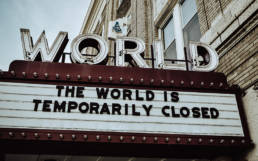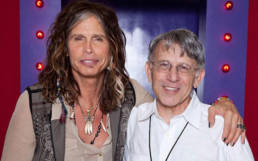In this continuing series, we asked leading pros in the sync sector for their survival strategies and assessments of the new world affected by the COVID-19 pandemic.
The music industry has a multitude of players, and no corner of this business has been left untouched by the current climate. That includes sync, where music and visual collaborators partner to drive the story and emotion of films, ads, shows, videos and more. But many productions are now on pause.
So, what happens next, and importantly, what’s best for dealing with right now? Leading sync professional, Richard Safir, shares his take on the situation, and strategies for moving forward.
Sync Music Pro: Robert Safir | Recording Professional, Library Owner, Producer & TV Composer
Music industry veteran, Robert Safir's long list of credits spans decades of success across both the business and creative sides. He is the founder of the iconic Track Record Studios in Los Angeles, an established author, and has produced many distinguished artists. He has been equally active on the sync side, where his compositions can be heard on shows like ABC Television, The Discovery Channel, E! Entertainment, The Biography Channel, BET, The Learning Channel, Spike TV, and others.

COVID-19 is obviously shaking up numerous music industry sectors -- how is this impacting you?
Robert: The most obvious way is that social distancing makes working with others very difficult. Sure, working virtually over the internet is possible, but one-on-one or group sessions are not possible. Of course, the stereotype of the composer is the ‘lonely guy’ sitting at his workstation and recording track after track, and that remains true – not a lot of interaction is required. But the real impact is with opportunity. Because everything is virtually shut down, there’s not a lot of activity taking place in composing and placing music. Some of my contacts are not even in the office. Until some semblance of “normalcy” (whatever that is) resumes, I don’t expect a lot of royalties to be coming in.
How are you (and your business) adapting?
Robert: There’s nothing that I personally can do, except keep on composing. That’s how I created my own library of cues in the first place. There are way too many unknowns at this point to make deals, create goals for the future, plan ahead – and so on. We don’t know how long this situation is going to last and we don’t know how the world will look afterward. So for me, it’s back to the basics – writing, recording, producing, and listening to music – until I get a sense of either a new direction or a return to the way things were done before the pandemic.

How do you see things for the industry — and sync in particular — progressing in the short and long term as a result of all this?
Robert: As far as adjusting to sync licensing scenarios, I can say this. I am usually an optimist. I look for solutions whenever possible. When it comes to what’s going to happen with sync licensing, etc., I’m becoming a little more skeptical than usual.
The reason, even if you disregard ASCAP and how they distribute funds, is that production has come to a virtual standstill. Movies, television, live concerts, even bars – no music is being played. I oversee a few music libraries, and I’m concerned that a lot of music won’t be picked up if there’s nowhere to place it. Further, if production companies can license music they’ve already paid for through blanket licensing, etc., they will lean toward using those cues rather than anything new.
Out front licensing fees have been dismal for a long time. You can have a contract that states the publisher will split advances between themselves and the writer. But with the vast competition in the music business, publishers realized some time ago that they can get away with not offering sync licensing advances altogether. Obviously, there are exceptions to this – for example, A-Listers like Hans Zimmer and others who can still get pretty much what they want. But the little guy? Not so much.
Let’s face it – it’s almost impossible to paint a rosy picture of the future if, in fact, we don’t even know if movie theaters are going to survive this pandemic. AMC is already considering bankruptcy. Production companies may lack new funding. And offering new movies-on-demand or for streaming is fine. But Universal Pictures, as an example, is going to charge $20 a pop for renting a newer movie. They must not be following the news. People are unemployed by the millions, many needing food and supplies. At best, even when affordable, people have to fork over $6 or $7 bucks for a rental. For Universal and others to say 'Yes, but you can rent it before or while it’s in theaters' is ridiculous if it’s not showing in theaters at all!
All of these issues are related. Anyone who really knows what’s going to happen is either lying or smoking too much weed. The future is as uncertain as ever. We all have to keep truckin’ and groovin’ and moving forward. The best way at a minimum is to keep writing and composing and don’t give up.
Someday, with any luck, all of this will be a distant memory.
This post is part of the a new series: The New World of Sync, where we speak with sync music pros in our community about how they're adapting to the new and changing landscape of the industry. Remember to sign up for our blog to find out when new posts in this series go live.
The content of this post was adapted from an article originally published in Digital Music News, as a broader partnership with Songtradr.
Support real artists


you now I’d not even considered the actual “production” of a TV Episode or Film. Even Green Screen Technology cannot negate the need for the actors, directors and support crews to gather together in enclosed spaces, which means no new production no matter how many new tracks I may produce for a library.
Yikes, might be a good time to put submissions on hold and focus on building new albums to submit as soon as it’s feasible.
Hi Martin. Thanks for your POV!
well the corona virus hasn’t changed my music business although i dont actually have a business lol ive been writing and recording my own hip hop songs 28 years now and not earned a single penny lol i only put them up on a couple social media site then whatever happen…happens 😀 ive never been bothered about the money, its about the passion, i get no support but.…i dont care because i can do what i love 😀 have my own small studio at home (cheap for you, but a huge chunk outta my wallet for me) haha but thats all i need along with a fully inked pen, plenty of paper and music 😀 it be cool if more people would check my songs out but not for the sake of views but for point of views, suggestion ways to improve even tell me if you hate it and its terrible lol everyones entitled to their opinion 🙂 i have no ego to bruise and cant be insulted or hurt because i really dont care lol i listen and soak it all up but use my head and not my emotion, each person has their view and thats it 🙂 cant control it so why care?
And to quote myself lol
“Why fear or dwell upon that which we cannot control? Control is but an illusion, everything eventually breaks down and/or breaks free, but.….to be truly be free you must discard your fears”
Thanks so much for your words, Chris. Awesome that you’re able to keep doing what you love!